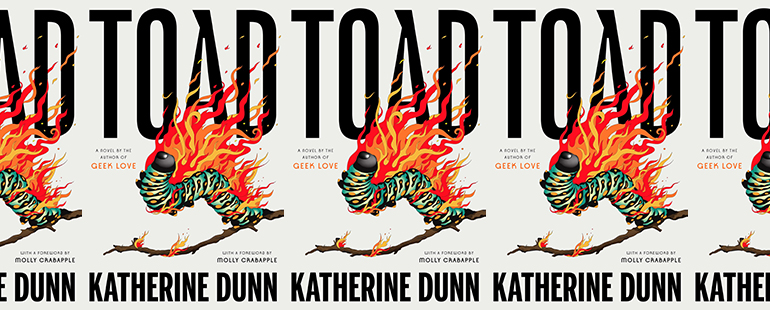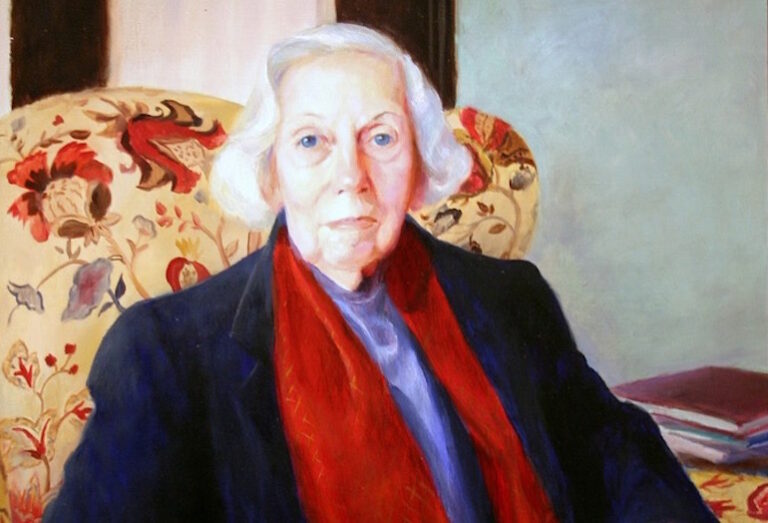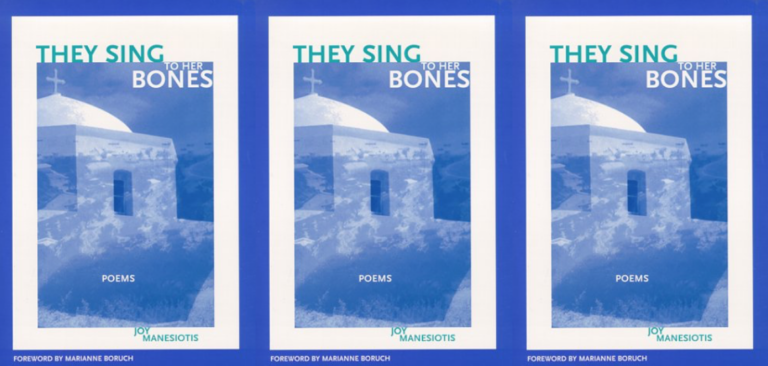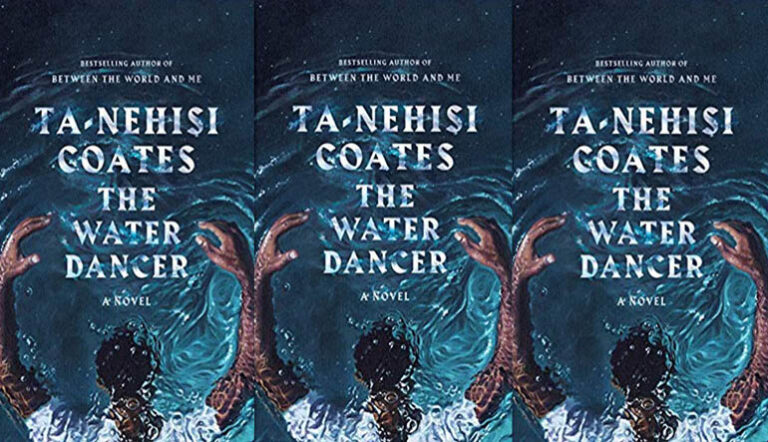Toad and a Woman’s Desire

What I want to read about these days is women who want things. I am not the first person to want this genre—it has a long and storied history. I can think of many books that foreground female desire, that follow ruthless and brilliant women, that go beyond “wife” or “mother” as the horizon of women’s ambition. I love these books—I read them regularly. But what I want, really, is a novel of a woman’s appetite. Not her goals or fantasies or desires, but the sheer hunger of wanting something. And Toad, a posthumously released novel from the archives of iconic author Katherine Dunn, is the most appetite-driven novel I’ve read in quite some time.
At first glance, Toad, which was published last fall, may seem too simple an account of women’s desire to amount to much. The novel follows Sally Gunnar, a middle-aged woman living alone in a house, reflecting on her life. Her reflection is incited by something so simple: her sister-in-law asking about Sally’s friends from college, Sam and Carlotta. (We find out later that her sister-in-law, Jean, helped Carlotta with a newborn baby.) This sparks Sally’s remembering, of memories involving Sally, Sam, Carlotta, and Rennel, Sally’s nemesis/crush, which read much like how Dunn’s own college years at Reed College in the 1960s may have been. Sally loves Sam, the dreamy hippie boy, who loves beautiful Carlotta. They are all wild and wannabe radicals, Sam eating horsemeat and starting a farm/commune with Carlotta, while Rennel drives him and Sally back and forth from college to the country house. They smoke weed, think they are more philosophical than they are, and act like naïve and idealistic twenty-year-olds. It seems very fun.
The loud and full flashbacks are a contrast to Sally’s reflections on her narrative present, where her only companions are her goldfish and a garden toad. But the isolation of Sally does not mean that she is philosophical or cerebral—her orbit, small as it is, affords her very real and physical opportunities. There’s comfort in this for Sally. She thinks, “Now there is no flesh left that supersedes my own, and so the truth comes out. I have bowed in every direction. I have followed whoever would leave me. In my time I have believed everything for the sake of particular veins in the forearms of particular people. But now the only blood that answers when I say, ‘What do you want?’ is my own.” A middle-aged body offers Sally more than it takes from her—it gives her the space to articulate her desires.
Of course, she acknowledges how countercultural her desire is. “It’s ridiculous,” she pans, “to discover at this age that there is something left in me that wants, that needs, that prefers, and that would rather.” Sally resists, albeit in isolation, the narrative that she cannot keep desiring things. What she wants now is to be “harmless,” to “never roil the bedsheets as I relive the embarrassment of some stupid moment where my vanity fell crooked on an unsuspecting head.”
Sally is a distinctly embodied character. She identifies as a fat woman, and her reflections on her romantic experiences make it clear that Sally feels herself as grotesque. Yet I am not sure that Sally is really so self-loathing as other reviews of this book make her out to be. In the opening pages of Toad, Sally reflects that “Mine has always been a flesh worship, and now a time has come when I am allowed to admit it, when the purposes of my religion can surface. There are only two sins I recognize—venial discomfort and cardinal pain.” Yes, she does remark that “the loathing I feel for myself is tremendous,” but this is not really a reflection on her body. This loathing comes from “the memories of when my motives have been vicious” which are “difficult to tolerate”—it’s yet another expression of her desire to be “harmless,” which is really a desire to atone for her past.
If Sally’s present hunger is for harmlessness, Sally’s appetite in the past is sexual: “it was never cold hot dogs that drove me, nor the sight of the picturesque sands. It was the muscles of your thighs, the warmth of your armpits, the thump of your blood in my ear. It was flesh, not philosophy.” Perhaps this is why I find any mention of her self-hatred or self-loathing lacking in many reviews. Sally knows what she’s doing—debasing herself, as she does for her lover in Beacon Hill who spurns her, is yet another form of her wanting. Her lover, Jack, is “beautiful, and he despised me,” and is the first person, out of Sally’s fifty-seven past partners, to ever bring her to orgasm. “I was surprised, and then I was wild with anticipation,” but Jack is “insulted” by her enthusiasm, “he must have realized I had been performing before. It disgusted him.”
Of course, Sally’s actual appetite is a source of stress and shame to her—she works at a donut shop in Beacon Hill where she eats donuts constantly, until Jack pees on them. He breaks up with her, and she goes to her job where she hilariously proceeds to toss all the donuts in the trash, telling her boss that he is “an anti-fuck manufacturer,” before accidentally landing on a paper cutter and severing several of his fingers. But after this incident, Sally recovers: “It seemed incredible that I should feel so empty and clean so short a time after I had been overcome with that lunatic misery…As I lay in bed, I told myself time would begin again after some sleep. There were plenty years left for bad thoughts, for replaying Mr. Chesbrough’s bleeding hand, my indiscreet, self-indulgent maundering, and the events of the night before.” She looks forward to the future, which is really the narrative present of Toad, where she can replay these events. It’s not only a mode of recollecting with shame—it’s a task she looks forward to. This is the night that the “possibility of solitude,” its comfort and stability, extends to her—and she takes it. Her desire for isolation is a serious one.
Sally is inconsistent, which is also to say, she’s deeply human. Her appetites and longings take different shapes. She befriends Carlotta to stay near to Sam. She throws away the donuts with delight. She sinks into shame on occasion. But Toad is not a novel about an isolated woman looking back with regret, nor is it a text about self-hatred. If Sally distrusts her appetite, or dislikes her bodily form, or feels miserable, it seems to me that she rather likes it. She gives us a litany of mistakes and embarrassment and odd collected memories, like the mind of an anxious person before bed. She wants an audience, wants to conjure Sam and Carlotta to tell her tale “with humorous fugues, and then taken them out for a drink to hear their tale in return.” Sally reflects on the past, spinning it into a tale to work through it. Once she’s told her story to us, she can enjoy her time, be ready to listen. At the end, she can rest a bit.


